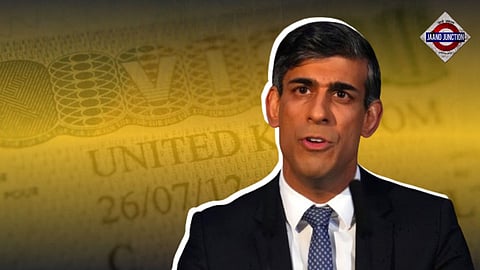

UK Prime Minister Rishi Sunak has decided to abandon plans to reduce Graduate Route visas, a favourite of Indian students, after significant opposition from his Cabinet members. Sunak's Cabinet colleagues, including Foreign Secretary David Cameron, raised concerns about the financial stability of British universities and the UK's economy if the Graduate Route visas for international students were curbed.
Earlier, Rishi Sunak was considering modifying the Graduate Route visa scheme to restrict visas to only the “best and the brightest".
Over 40% of the beneficiaries of the Graduate Route visa of the UK are Indian students.
The initial proposal aimed to limit the number of graduate visas, which allow international students to work in the UK for up to two years after completing their studies, as a measure to lower migration figures.
However, the government is now considering more modest reforms to address system loopholes and prevent abuse of the immigration system, according to The Guardian.
The UK government reviewed the Graduate Route visa, and on May 14, the Migration Advisory Committee (MAC) submitted a comprehensive report on the Graduate Route visa, which caused consternation among the international student community.
In fact, applications to UK universities were dropped because of the visa programme uncertainty.
According to the MAC report, the top five nationalities account for nearly 75% of all Graduate Route visas with India accounting for over 40% of them. Indian nationals made up a higher proportion of Graduate Route visas (42%) compared to their proportion of student visas (26%).
In 2023, 114,000 Graduate Route visas were granted to main applicants, with a further 30,000 being granted for dependants. The take up of these visas is largely concentrated among 4 nationalities. The top 4 nationalities -- India, Nigeria, China and Pakistan -- accounted for 70% of all Graduate Route visas, with India accounting for over 40%.
Sunak's move, which targets agents marketing graduate visa schemes overseas, including in India, aims to show a tougher stance on immigration, which is a key issue in the UK's January 2025 general election.
These agents could face penalties if they fail to deliver the quality of students they promise.
Additionally, foreign students using the graduate visa route might be required to pass mandatory English tests like IELTS, and universities or colleges with high dropout rates could lose their licences to recruit international students.
Sunak's retreat from more radical measures follows interventions by Chancellor Jeremy Hunt, Foreign Secretary David Cameron, Home Secretary James Cleverly, and Education Secretary Gillian Keegan. They argued that restricting the visa scheme would negatively impact universities and the UK economy.
The anticipated reforms are expected to coincide with the release of the Office for National Statistics’ quarterly net migration figures, which are projected to remain high.
Indian students and alumni groups in the UK have voiced strong support for retaining the graduate visa, rejecting claims it is merely a way for overseas students to secure low-paid jobs.
The MAC report found that Graduate Route visa holders often start with lower-paid jobs but see their wages improve over time when they switch to Skilled Worker visas.
Indian students group in the UK have penned down a detailed letter to PM Sunak's Right Honourable, NISAU UK's Chair Sanam Arora highlights several crucial points. She discusses the economic contributions of international students and the strong public support for the Graduate Route.
In the letter, NISAU UK calls for making no changes to the Graduate Route, nor any adjacent changes that may make the UK a less welcoming or less attractive destination for international students.
The UK creative industries are also concerned about the potential loss of talented graduates. Creative UK, representing the creative sector valued at £108 billion annually, warns that axing or limiting this visa could deter international students from choosing the UK for their studies.
Sanam Arora, chair of NISAU, stated, “The best will go to where the best offer is, and any worsening of the graduate route will make the UK’s offer significantly worse,” reported the Guardian.
Arora pointed out that Indian students, who account for over 40% of all graduate visas, often invest substantial amounts in their UK education and seek meaningful work experience afterwards.
Many Indians go for expensive educational loans to pay for their studies in the UK.
“It is only reasonable that they would want some return on this very significant investment. And the return they seek is the very simple opportunity to gain meaningful work experience for a temporary period of time,” Arora was quoted by The Guardian as saying
One previously considered option was to restrict graduate visas to the 24 research-intensive Russell Group universities or to shorten the duration of the visas.
However, vice-chancellors from more than 20 universities across the north of England, many of which are non-Russell Group, urged Sunak to maintain the current Graduate Route visa system. They referenced a review by the Migration Advisory Committee, which found no evidence of widespread abuse.
In their letter, the vice-chancellors warned, “Universities from Sunderland to Sheffield, Leeds to Lancaster, Liverpool to Teesside, Bradford to Huddersfield, and York to Newcastle will all be harmed by the removal or reduction of the graduate route visa,” reported the Guardian.
A government spokesperson affirmed the commitment to attracting top talent while safeguarding the immigration system from abuse.
“We are committed to attracting the brightest and best to study at our world-class universities, while taking the necessary steps to prevent abuse of our immigration system. We are now considering the Migration Advisory Committee’s findings and will respond in due course,” they said, reported The Guardian.
